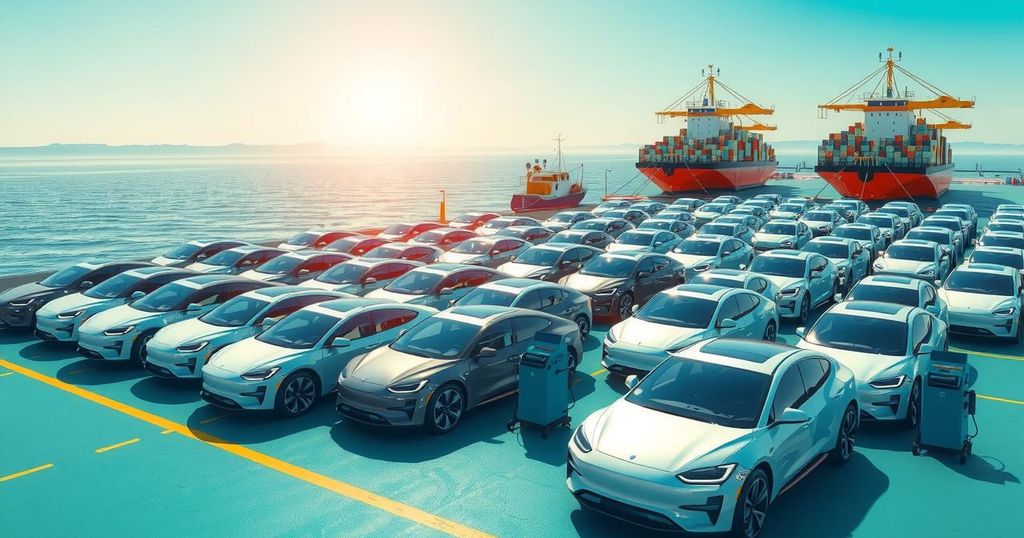BYD Surges Electric Vehicle Shipments to Brazil Ahead of Tariff Hikes
BYD has significantly increased its electric vehicle shipments to Brazil ahead of looming tariff increases, which could impact their production plans in the country. Sales of EVs are surging, but BYD faces legal hurdles and concerns from local automakers regarding its commitment to local production. GWM, another Chinese firm, is making strides with hybrid vehicle production amid similar industry challenges.
In a significant move, BYD has accelerated its electric vehicle exports to Brazil, shipping a record number ahead of forthcoming tariff increases. As reported by Reuters, this surge comes amid uncertainties surrounding BYD’s production prospects in Brazil. The Brazilian Association of Electric Vehicles (ABVE) noted that sales of electric and hybrid vehicles in Brazil are projected to soar by 85 percent in 2024, surpassing 170,000 units. Last year alone, BYD saw its sales in Brazil skyrocket nearly 328 percent, totaling 76,713 vehicles.
However, the favorable tariff environment that initially drew BYD to Brazil in 2015 is set to change. Tariffs on imported EVs, which had been tariff-free to promote green technology adoption, will soon see increases starting at 10 percent in January 2024, escalating every six months to a peak of 35 percent by mid-2026. Current tariffs stand at 18 percent and are projected to rise to 25 percent this coming July as the influential Brazilian auto manufacturers’ group, Anfavea, pushes for quicker increases. A government representative indicated that this request is currently under consideration.
Chinese automakers are anticipated to ramp up their exports to Brazil by nearly 40 percent this year, aiming for about 200,000 vehicles. BYD is reportedly ahead of the curve, having already shipped around 22,000 vehicles this year, including the use of the world’s largest car-carrying ship to support this influx. Furthermore, by importing vehicles in the first half of the year, BYD is strategically positioned to benefit from a government policy allowing toll-free imports that could total US$169 million for hybrids and US$226 million for fully electric cars until July 2025.
Despite the excitement among consumers for these low-cost electric vehicles, Brazilian automakers are expressing concern that BYD’s increased imports may signify a decline in the company’s commitment to establishing a production base in Brazil. The former Ford plant acquired by BYD last year faced a serious setback when Brazilian authorities intervened to rescue 163 construction workers found living in what were described as “slavery-like conditions.” Although BYD has distanced itself from the contractor involved, the company still faces legal issues that have delayed operational production at the site until December 2026, according to local officials.
Igor Calvet, president of Anfavea, remarked, “We support the arrival of new brands in Brazil to produce, promote the components sector, create jobs and bring new technologies.” However, he expressed concern that an influx of imports could stifle local investments in production. The confederation has not been informed of any collaborations with local suppliers or contracts for the BYD plant, which is unusual for a production facility expected to start operating within 18 months. Calvet pointed out, “Even if the factory is here – what value is it really adding if the components, development, and technology is all from abroad?”
In contrast, Chinese competitor GWM, which acquired a factory in Brazil back in 2021, is preparing to launch its hybrid Haval H6 SUV next month. Ricardo Bastos, GWM Brazil’s director of government relations, noted that while they are currently engaged in discussions with around 100 suppliers in Brazil, the necessary infrastructure for locally producing all essential components for electric vehicles is yet to be established.
In summary, BYD’s increased exports to Brazil highlight a strategic maneuver ahead of significant tariff hikes, with a remarkable surge in electric vehicle sales across the nation. Despite the potential for growth, concerns loom over BYD’s commitment to local production following legal troubles and a slow development of supplier relationships. Meanwhile, GWM appears to be advancing with its plans amid similar challenges. The scenario underscores the complexity of the Brazilian automotive landscape as it navigates the transition to electric vehicles.
Original Source: macaonews.org




Post Comment